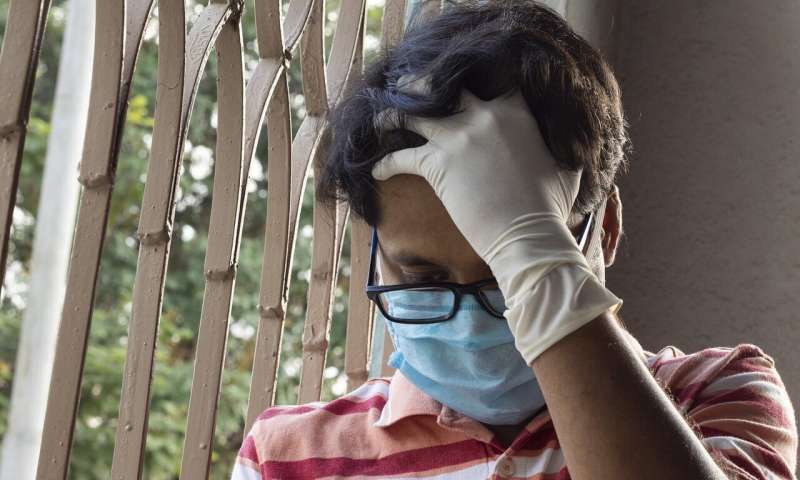COVID-19 leaves unpaid carers without physical and mental health treatment

New research shows unpaid carers seeking formal help with their physical and mental health during the lockdown were unable to access it.
This was at a time when the majority (70%) of carers had to provide more care for older, disabled or seriously ill relatives or friends, and millions more people took on an unpaid caring role.
New research carried out by the Universities of Birmingham and Sheffield, in partnership with Carers UK, shows well over half (58%) of people caring for someone outside of their own home were unable to get through to NHS 111 services in April.
This is compared to 33% of the general public.
Eighty-nine percent of carers saw their NHS treatments cancelled or postponed in April, compared to 77% of the general public. As it is difficult for many carers to find the time, or get replacement care, to receive treatment, many will still have unresolved health problems.
Previous research has shown that the pressure of lockdown has taken a huge toll on unpaid carers' mental health, with many reporting feeling isolated, overwhelmed and worried about burning out.
Those with acute mental health needs have been unable to get help, with the latest findings showing that close to half (42%) of carers needing psychotherapist services were unable to access them in.
Half (50%) of carers needing formal care services could not get them in April, and 40% in May.
Dr. Matthew Bennett, Senior Lecturer at the University of Birmingham said: "Before the pandemic, unpaid carers were more likely to experience negative health and economic outcomes. Our new reports on 'loneliness and use of services' and 'financial wellbeing' show that these have increased.
"We find carers are more likely to have had their NHS treatments postponed or cancelled, and experience greater loneliness, financial strain and financial anxiety for the future. Our findings are worrying. They suggest that the Government policy of 'protect the NHS' did not extend across all services, and restrictions in response to the pandemic had a negative impact on carers.
"We hope we can continue to raise awareness of the pressures that carers face as they support others."
Helen Walker, Chief Executive of Carers UK, said: "Some carers have had to cope for months without any outside support—seeing the health, wellbeing and mobility of the person they care for deteriorate, and their own physical and mental health heavily impacted as well.
"With a large number of support services still closed, carers are desperate for a break. It is imperative that these services are reopened as soon as possible and that local authorities undertake a rapid reassessment of carers' needs. Likewise, the NHS must quickly identify carers and prioritise their needs and medical treatment. If their health breaks down, the cost will be catastrophic.
"Carers must not be left unaided should there be a second wave or future lockdowns. Their care is vital to supporting older and disabled people in our communities."
Professor Sue Yeandle, head of the Sustainable Care programme at Sheffield University, said: "COVID-19 has focused new attention on the importance of care. As this new report shows, some of the restrictions Government introduced in spring 2020 had troubling effects on carers. We hope the report will raise awareness of this situation so that, in any similar future scenario, carers can be protected from being unable to access crucial health and care services."
In its Recovery Plan, Carers UK is calling for unpaid carers to be prioritised as part of the Government's recovery planning. Specific recommendations include:
- Systematic reviews and planning to ensure that those carers most at risk of poor wellbeing and burn out get support
- Urgent reassessment of carers' support needs by local authorities
- Reinstatement of care and support services as soon as possible
- Should another lockdown occur, carers to have priority access to the NHS 111 service and their planned medical treatment to be prioritised going forward
- Sustained investment in carers' mental health, wellbeing and ability to care
- Carers' voices and experiences put at the heart of building future recovery, locally and nationally.
Dr. Yanan Zhang, Research Fellow at the University of Birmingham said: "Unpaid carers have difficulty in accessing the NHS and Community Health and Social Care services during the pandemic. Our analyses show that the overwhelming majority (90%) of unpaid carers who had been waiting for NHS treatment had their appointments cancelled or postponed during April. Helping unpaid carers access such vitally important, and in many cases life-saving resources is critical to keep the current care system—already under unprecedented strain—sustainable."
As well as being unable to access services, at the height of lockdown carers felt more financially insecure, compared to the general public—especially women. 1.3 million carers said they were finding it very difficult to get by, quite difficult to get by or were just about getting by.
Surprisingly, working age carers aged 31-45 caring felt the most financially insecure.
Given the extra costs of caring, and the impact caring has on people's ability to work, Carers UK is calling for an immediate increase in Carer's Allowance—the main benefit for carers looking after someone for 35 hours or more a week—currently just £67.25 a week.



















